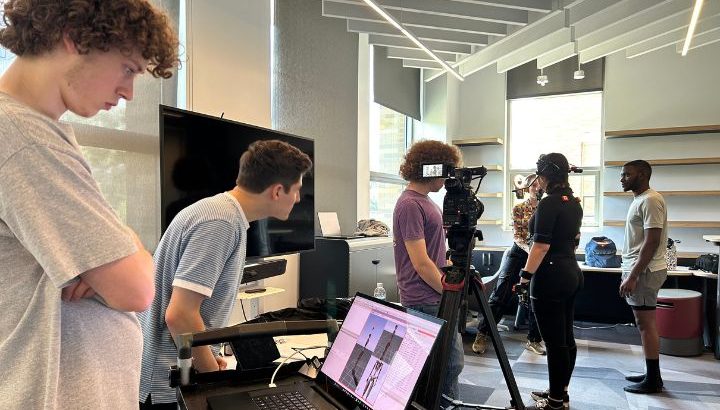
Game Development Students Bridge Disciplines to Craft Branching Narrative Video Game Chapman student and alum duo launch teaser for their upcoming motion capture, branching-narrative game, Project Vesperi
October 9, 2023
Within the bustling halls of Fowler Engineering, even the simplest ideas for the future of technology can be transformed into life-changing, collaborative, fully-realized dreams—often through a spirit of innovation that connects all disciplines. For Trevor Gore (Screenwriting, ‘23) and Brandon Hill (Film Production, ‘24), their dream of creating an original video game is well on its way to becoming a reality. Thanks to extensive cross-disciplinary collaboration, Chapman’s game development program resources, and sheer passion, their branching narrative game entitled Project Vesperi will soon be available on the Steam and Epic Games platforms. The teaser trailer, which was released on YouTube in August, showcases motion capture footage from the game.
The cinematic single-player game will follow Dr. Evelyn Roth (Sophia Khan), an astrobiologist from Earth who has been sent to Venus to investigate a sign of life. According to the official game description, “when an intruder enters the station, Evelyn must make choices that impact the lives of everyone around her, and ultimately, humanity.” Each decision players make—every dialogue choice or interaction with in-game objects—will leave a unique impact on the world and plotline, allowing for a different gaming experience with every playthrough.
Navigating the First Steps
As Game Development minors, Gore and Hill’s plans for this immersive and complex project originally took root as a thesis concept. In preparation for their thesis period, the two spent a full semester in a state of balancing logistics; this time was dedicated to determining how to share the story they wanted to tell while maintaining a firm awareness of what the resources at their disposal could achieve.
“I think one of the biggest things that we did was pre-production, the first stage of game development. It’s really just about understanding the major parts of your game and how you’ll go about building a plan that will make that achievable,” said Gore. “During this time, I would talk with Brandon, asking, ‘Okay, is this possible [in Unreal Engine]? Are there assets out there that we can get to make this work? What’s the full feature set? What’s the full narrative scope of our project?’ It was this constant check-in process along the way.”

Trevor Gore (left) and Brandon Hill (right) spent an entire semester balancing of the logistics of Project Vesperi
Achieving these goals on a college student’s budget meant taking advantage of a plethora of resources available to Chapman students, such as Dodge College of Film and Media Arts’ motion capture equipment and Fowler School of Engineering’s bookable study pods. They also took advantage of Agile Software Development practices they had learned in CPSC 245, a course on Unity Programming. Additionally, the pair sought out opportunities to hear from leading Game Development experts through the Panther Games student organization. As President of Panther Games, Gore hoped this would help them both gain valuable insight into what it would take to design a compelling and well-constructed game from the ground up.
In Hill’s experience, it was also a vital decision to explore other free-to-use materials from all corners of the Internet, from Unreal Engine 5 (a free next-gen game engine) to various YouTube resources. “I was inspired by a short film on YouTube that was made entirely in Unreal Engine,” shared Hill. “I thought, ‘This is incredible, what a fantastic tool this could be for cinematic storytelling because it’s approaching photorealism in real-time.’ As opposed to waiting for hours to see what your shot looks like once it finally finishes rendering, you can see the exact way it’s meant to be seen on your computer in that exact moment.”
Chapman Students Reach Higher
Last fall, with firm plans, plentiful ambitions, and key technology at their fingertips, Gore and Hill hit the ground running in the prototyping phase. Despite its humble beginnings, the project has since evolved into something much grander over the past year in development: a free branching narrative game that showcases the wonders of what a few Chapman students can achieve.
It Takes a Village
When understanding what has helped this complex, large-scale endeavor transform from a bare concept into the game it is today, the phrase “it takes a village” comes to mind. From the early stages, it was clear that their project was rapidly becoming much more than a two-person job; game development can require experts in a variety of fields from sound design to programming.
Gore and Hill first leaned on the university community to fulfill these needs, tapping into their networks to hire a team of talented and dedicated Chapman students. The recruitment and team-building process began in their Game Development thesis course, where they selected several core programmers all in eager pursuit of FSE degrees. This group includes Systems Programmer Sean Robbins (Computer Science, ‘21), UI/UX Programmer Meghna Raswan (Computer Science, ‘23), Gameplay Programmer Nathan Cuadros (Data Analytics & Economics, ‘23), and Isa Lee (Computer Science and Animation and Visual Effects, ‘24). Later, Isabella Miller (Screenwriting, ‘23) and Brian Wright (Animation and Visual Effects, ‘23) were brought on to provide sound design and additional animation support.
Today, their team consists of cast, crew, and developers all united under one entity: Last Praetorian Interactive LLC. In order to see their project through, Hill and Gore took on executive roles: Hill as the Director, Creative Lead, and Cinematic Designer along with Gore as the Writer and Production Lead.

Brandon Hill making adjustments to actress, Julia Cornell’s gear.
“Game development is a very collaborative process, and when you’re working out of a university, it involves going between schools to find multiple disciplines,” said Gore. “While the Game Development minor is housed in Fowler and is absolutely important for the in-depth understanding of programming and what you can or can’t do with the system, we’ve also got people who are from Dodge, from more of the film and storytelling department. We have people from Wilkinson who are really into writing and world-building. There are people from Argyros who want to understand what it’s like to put together a release strategy and marketing campaign. Every single discipline has something crucial to add to the overall game development process. There’s no stone—or college—left unturned when you want to create a game that has a well-rounded gaming experience.”
Pipe Dream Beginnings to Reality
With the support of various Game Development faculty, the team returned to Swenson Family Hall of Engineering this past August to resume filming, working hard to translate scenes shot in one of FSE’s research pods into a tangible play experience. Before any edits or more in-depth animation choices can be made, their extensive filming process has involved rolling camera, sound, and two separate motion capture elements simultaneously for just one character at a time. Despite this complicated and often challenging process, Hill expressed excitement at seeing the product come together during the editing stage.
“I’ve been amazed that throughout this entire process of dropping the animations, syncing it up, and taking the performance edits where I take the reference footage and figure out the best takes that mesh over each other, it blows me away how talented our actors are,” said Hill. “It’s the happy accidents on set that make it all so magical, and then you put it on their digital characters, the environments, and the sets that our amazing team has created—it’s just super inspiring. … I’ve worked on many projects in my life and I’ve never been more proud to be a part of something. People are just so excited about the potential of what this could be and want to help and put their beauty into it.”
For Gore, returning to the place where these dreams were once whiteboard scribbles has served as a reminder of just how far Project Vesperi has come.
“I think one of the biggest things that keeps us going is the passion and excitement that we have,” said Gore. “We were just here—just the two of us in one of the pods—writing down the story and mechanics on the whiteboards, talking about how the narrative is going to be structured. It was just us; it was a pipe dream. We knew we needed to be grounded: ‘we’re excited about this, but are we going to find other people? Are other people going to be excited about this?’ It’s so fulfilling to see people excited about your work. We’re often just amazed by the responses. … Everyone is just super excited to be a part of this—as are we. We started this whole thing and we are thrilled to be a part of the journey with everyone.”
Those interested in supporting Project Vesperi can check out their official website—where they can watch the teaser trailer and meet the team—or follow @VesperiGame across various social platforms for more information. Those looking to play upon its release are encouraged to wishlist the game on Steam and Epic Games.

